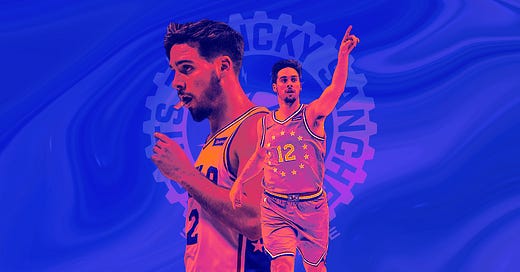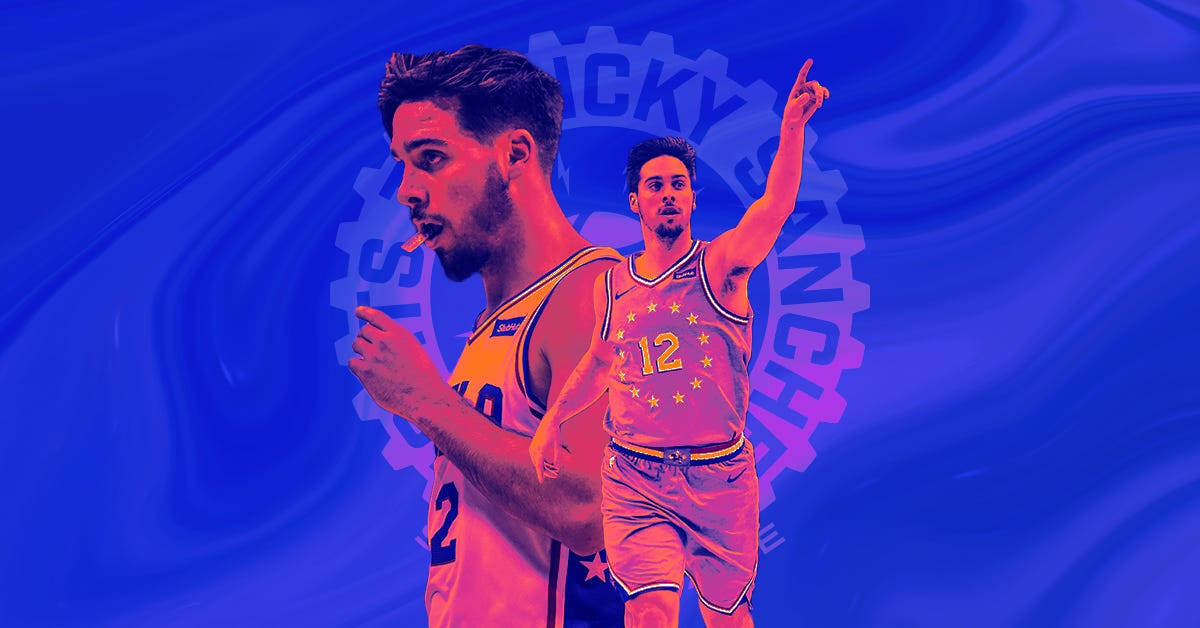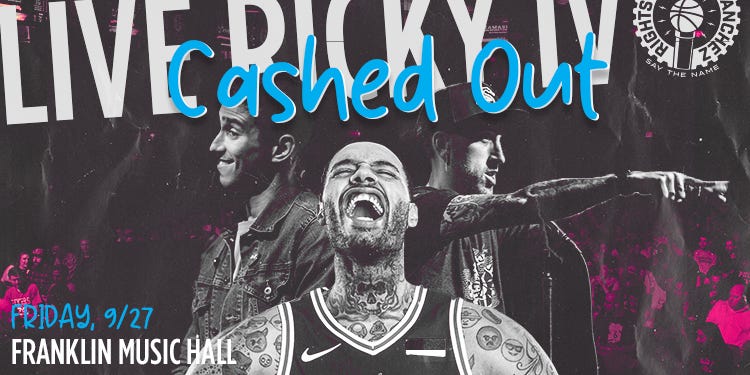A Process Hall of Fame Tribute to T.J. McConnell
TJ will always have a place with us in Philadelphia.
Andrew Unterberger is a famous writer who invented the nickname 'Sauce Castillo' and is now writing for The Rights To Ricky Sanchez, as part of the 'If Not, Pick Will Convey As Two Second-Rounders' section of the site. You can follow Andrew on Twitter @AUGetoffmygold and can also read him at Billboard.
Andrew's writing is brought to you by Kinetic Skateboarding! Not only the Ricky's approved skate shop, but the best place to get Chucks, Vans, any apparel. Use code "DAVESILVER" for 9.1% off your order.
Remember Aaron Craft? The star Ohio State point guard was on the Philadelphia 76ers for a hot second one Process Summer -- he even played on the Casper Ware and Hollis Thompson-led roster that brought us the 2014 Orlando Summer League championship banner that currently flies in the Not-Wells Fargo Center. Title aside, his time on the Sixers summer squad was not exceptional: He couldn’t shoot, he couldn’t score, he couldn’t really penetrate well enough to distribute. Bill Raftery might’ve said that his leadership and heart somehow secretly brought us to that Orlando title, but generally he proved himself to Sixers fans as not an NBA player -- and the NBA agreed, as he’s yet to play a single regular-season game in the pros.
Mention Aaron Craft to Sixers fans, and you’ll get a bunch of painfully exaggerated eye rolls. Most of us will happily bloviate to you for precious minutes about just how much he sucks -- partly because he does suck, and partly because no one wants to end up being mistaken for one of those college basketball romantics who lionizes the hard-nosed, largely unathletic white guy as Everything Right About the Game. Subsequently, the Craft types have the toughest row to hoe with Process Trusters: They inherently seem like fool’s gold, oversold and underdelivering, the province of dudes who live to tell you about why analytics are ruining the game. Essentially, they seem like Doug Collins guys.
This is all to say, of course, that it’s really fortunate for all of us that T.J. McConnell was actually good.
Not that too many of us expected him to be, of course. I watched plenty of Teej at Arizona his first year there after transferring from Duquesne, but while I certainly respected his aggressive competence, I was too busy lusting after Aaron Gordon and Rondae Hollis-Jefferson to really give much consideration to his pro prospects. Upon his arrival on the Sixers Vegas roster in Summer 2015 -- signing a Hinkie Special contract after going undrafted -- I expected the undersized, range-limited point guard to have a fairly Craft-y showing for us. But though his numbers weren’t all that extraordinary either -- 18 minutes a game, about four points, three boards and four assists per -- there was a real spark there, not just an intelligence but a verve, an ability to process and implement the game at NBA speed.
It was enough for T.J. to make the training camp roster for the Sixers, but most still assumed that would be the end of the line for him. If you gave even money between him and Florida product Scottie Wilbekin -- who put up bigger numbers in Summer League, though not all that impressively, and also made it to training camp -- to get the final guard spot on the roster, most probably would’ve bet on Wilbekin. But a strong preseason showing (averaging about six points, five assists and two steals in 22 minutes a night) saw him separate from Wilbekin and the rest of the pack, and make a compelling argument to make the 2015-’16 Sixers squad. Once he was actually named to the roster, it was already enough to prove he was no Quad-A punchline.
There wasn’t a lot to feel good about on that 2015-’16 squad. The team started out bad and got worse, with Jahlil Okafor quickly proving there was likely no grand design behind Sam Hinkie’s drafting of him with the No. 3 pick the previous summer -- and the eventual deposing of Hinkie that season making it a moot point anyway. The team went 10-72, and our point guard rotation consisting of us enduring one shitty option until we couldn’t take it anymore, then switching to another shitty option, rinse, cry, repeat. T.J. couldn’t save us there, but he did show us something: In 81 games, he averaged about six and five, shot competently, and generally proved a solid decision-maker and floor general. He hustled, he squeezed into the gaps, he slapped the hardwood of our imaginations. He proved he belonged, to Brett and to us.
But still, no one could’ve expected the memories that laid ahead for us with T.J. From the time Joel Embiid stepped onto the court, instantly and single-handedly bringing the Sixers into a new era, Teej was ready to make a difference. The good times flowed from there: The near triple-double in Detroit (finish the damn layup, RoCo!), the game-winner over Carmelo Anthony in New York, the three-threes game in Denver -- all wins, btw, which was a thing that the Sixers were actually doing now. And when he wasn’t producing on the court, he was keeping things together off of it, connecting and supporting teammates, lending JoJo a neck to strangle. He and Robert Covington became Our Guys, the rare few who survived 2015-’16 without getting the permanent 10-72 stink on them, the guys who seemed worth keeping around when things got actually good.
And then the next year, we got the official T.J. Game. Down 3-0 to the Boston Celtics in the second round of the NBA playoffs -- coming off one of the most dispiriting, confetti-soaked losses in recent franchise history -- Brett inserted Teej into the starting lineup, a move that ignited the team beyond our grittiest fantasies. It was only 19 points, seven boards and five assists, but it felt like absolute sorcery: Watch the highlights today and T.J. still looks like Magic Johnson jumping center in Game 7 of the 1980 finals. The Celtics were prepared for JoJo and they could shut down Ben Simmons almost completely, but they had no answer for T.J. McConnell getting into the creases, throwing the ball ahead, being his pesky bulldog little self. In an absolute nightmare of a second round, it was the one part of the dream worth holding onto, the fondest “1” in a 4-1 series loss that I can ever remember.
Last year, we were sadly awoken from that dream, as a second-half T.J. slump magnified the fact that he no longer really made for a logical fit on a team already catering to one point guard of exceedingly limited range. He was out of the rotation altogether once we got into the teeth of the playoffs, with Brett Brown passing on any potential sequel to the Boston Game. Still, Teej proved the consummate teammate, showing more excitement and compassion for Markelle Fultz than anyone early in the season (even as Fultz was swallowing his rotation minutes), literally pulling Jimmy Butler out of the fray when it looked like Jimothy was about to lose his country cool against Minnesota, and unforgettably throwing up the W for… uhhh Wilson Chandler maybe?... against Detroit. T.J. never complained, never sulked, never stopped being less than 100% T.J. He was an enormous reason why one of the most potentially explosive locker rooms in the NBA never actually ignited last year.
The barrier of entry was even higher for T.J. than we may remember in 2019 -- not just to make it on the Sixers and in the NBA, but to truly become one of the favorites of the Process Phaithful. We've been conditioned to distrust players of T.J.'s makeup and skill set, to associate them with team building that leads straight to the middle, if that. But Teej not only helped get us through the losing, he played a huge part in our pivot to actual winning -- and he did it while double-fisting beers for us and proclaiming his distaste for Cleveland, both practically and metaphorically. He'll always have a home in Philadelphia, and he's welcome to cackle along with us at Aaron Craft and Scottie Wilbekin memories any time.








